人教版(2019)必修二:Unit 4 History and traditions Period 1 Reading and Thinking课件-(28张ppt)
文档属性
| 名称 | 人教版(2019)必修二:Unit 4 History and traditions Period 1 Reading and Thinking课件-(28张ppt) | 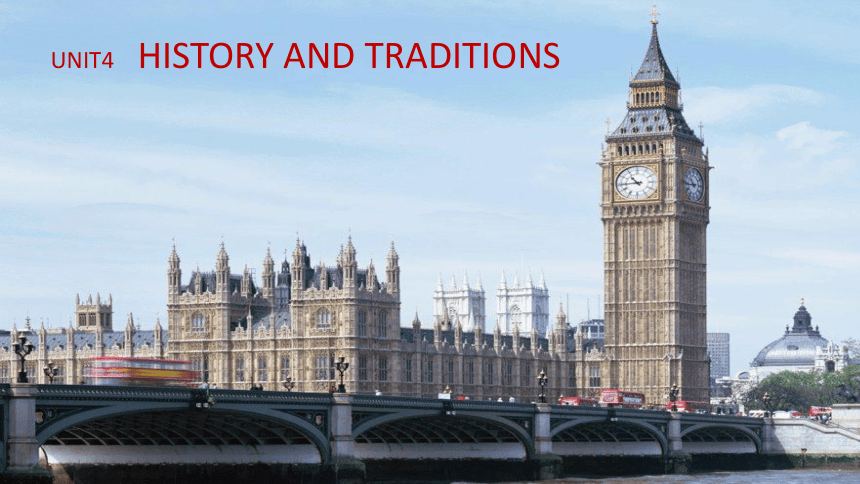 | |
| 格式 | pptx | ||
| 文件大小 | 1.4MB | ||
| 资源类型 | 教案 | ||
| 版本资源 | 人教版(2019) | ||
| 科目 | 英语 | ||
| 更新时间 | 2021-10-08 16:21:07 | ||
图片预览


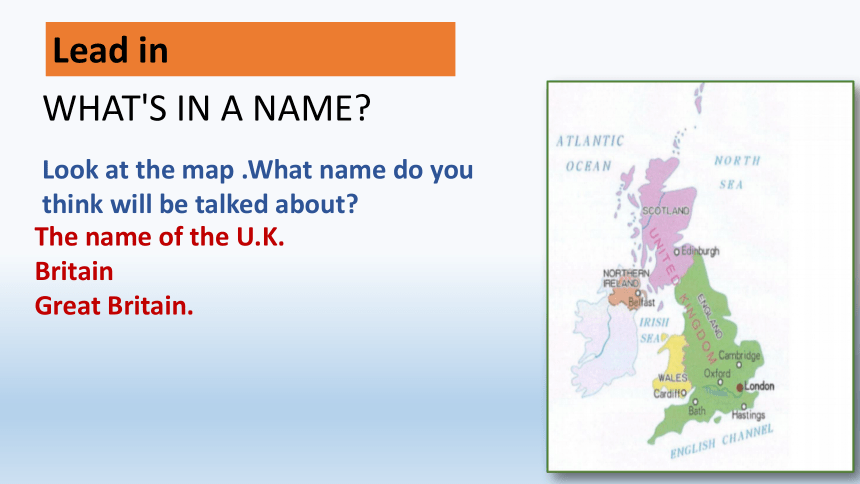
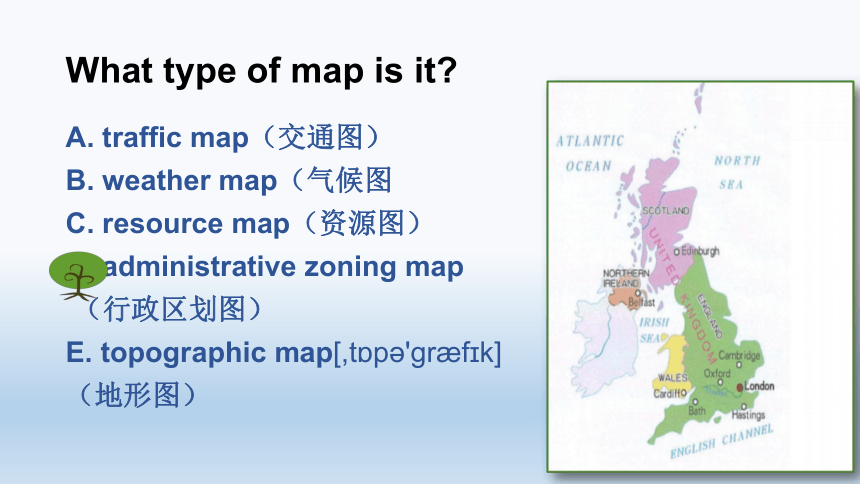
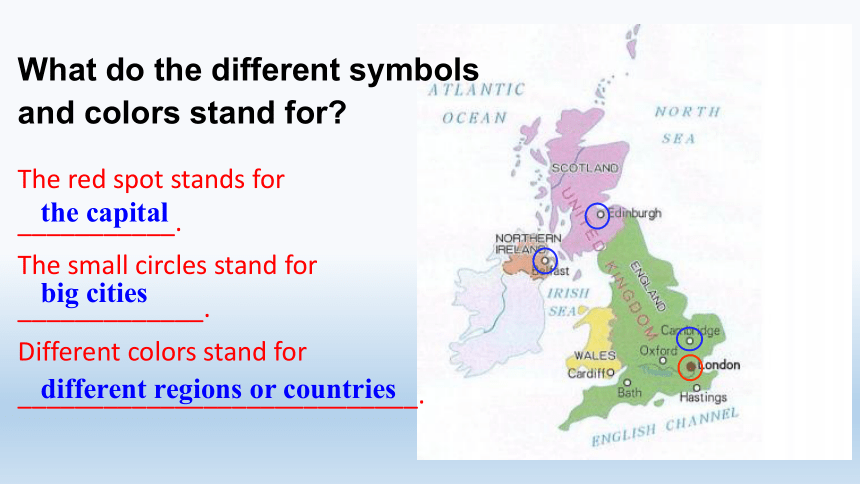
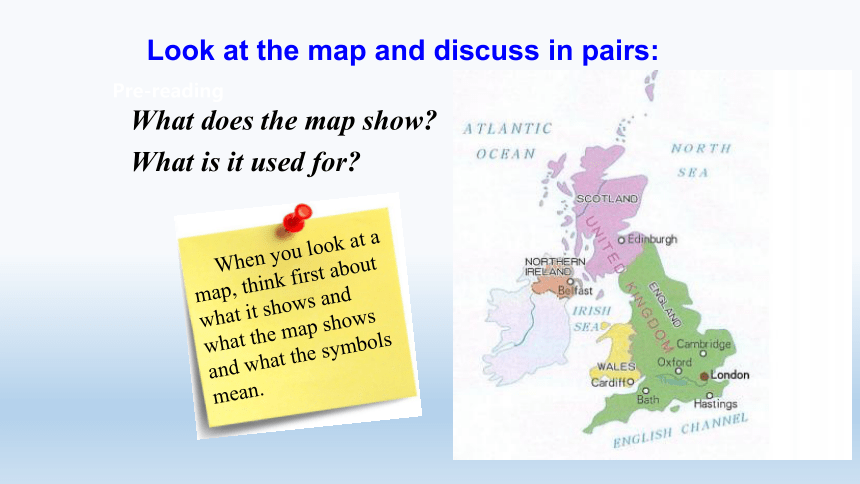
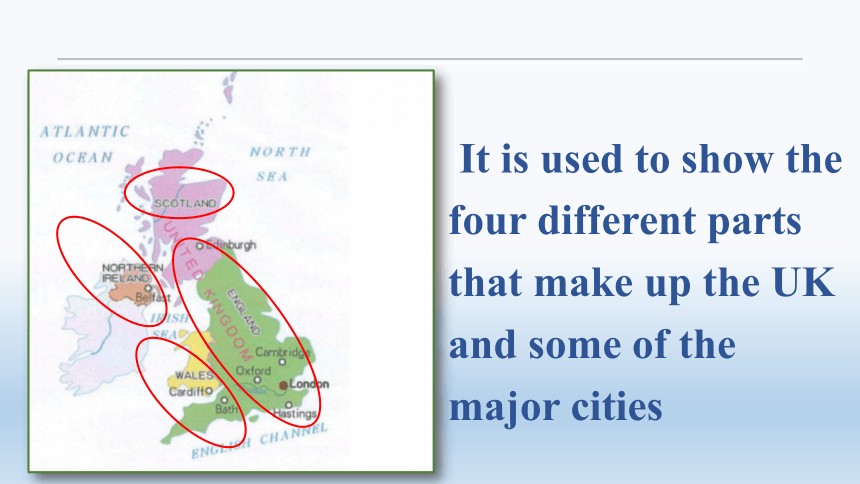
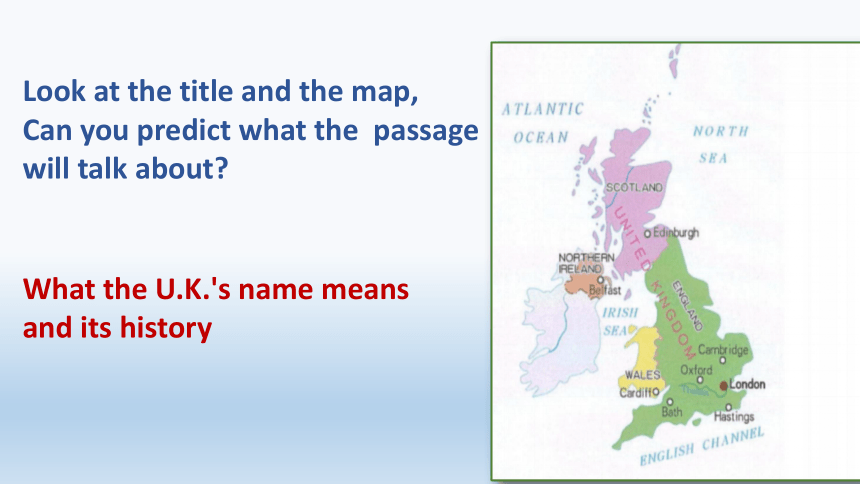
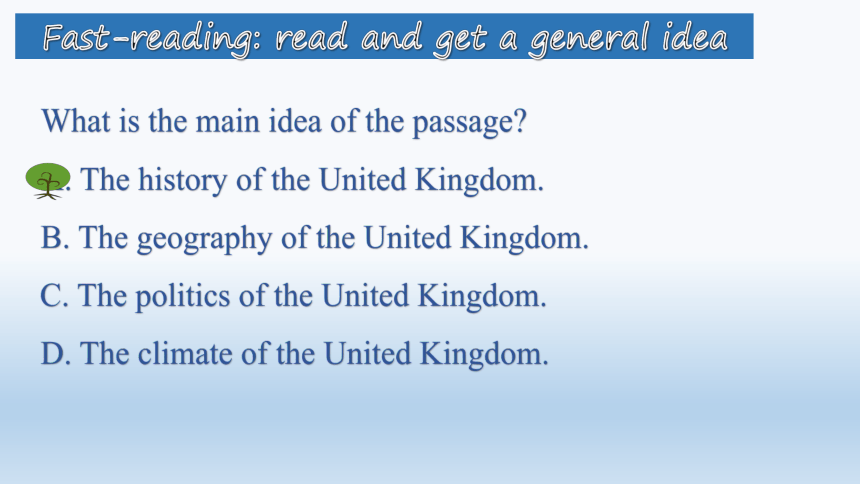
文档简介
(共28张PPT)
UNIT4
UNIT4
HISTORY
AND
TRADITIONS
Read
about
the
history
and
traditions
of
the
UK.
2.
To
be
able
to
give
a
brief
introduction
of
the
UK
3.
Talk
about
Chinese
history,using
what
they
have
learned
in
this
lesson.
Deepen
students'
understanding
of
the
long
history
of
our
own
country.
WHAT'S
IN
A
NAME
Look
at
the
map
.What
name
do
you
think
will
be
talked
about
The
name
of
the
U.K.
Britain
Great
Britain.
Lead
in
What
type
of
map
is
it
A.
traffic
map(交通图)
B.
weather
map(气候图
C.
resource
map(资源图)
D.
administrative
zoning
map
(行政区划图)
E.
topographic
map[,t p 'ɡr f k]
(地形图)
What
do
the
different
symbols
and
colors
stand
for
The
red
spot
stands
for
___________.
The
small
circles
stand
for
_____________.
Different
colors
stand
for
____________________________.
the
capital
big
cities
different
regions
or
countries
Pre-reading
Look
at
the
map
and
discuss
in
pairs:
What
does
the
map
show
What
is
it
used
for
When
you
look
at
a
map,
think
first
about
what
it
shows
and
what
the
map
shows
and
what
the
symbols
mean.
It
is
used
to
show
the
four
different
parts
that
make
up
the
UK
and
some
of
the
major
cities
Look
at
the
title
and
the
map,
Can
you
predict
what
the
passage
will
talk
about
What
the
U.K.'s
name
means
and
its
history
Fast-reading:
read
and
get
a
general
idea
What
is
the
main
idea
of
the
passage
A.
The
history
of
the
United
Kingdom.
B.
The
geography
of
the
United
Kingdom.
C.
The
politics
of
the
United
Kingdom.
D.
The
climate
of
the
United
Kingdom.
Read
the
text
quickly
and
match
the
following
parts.
a.
An
introduction
to
the
passage.
b.
The
UK
is
a
mix
of
history
and
modern
culture.
c.
The
four
different
groups
of
people
in
the
history
of
the
UK
and
their
influences.
d.
The
differences
and
similarities
in
the
four
countries.
e.
The
formation
of
the
the
United
Kingdom.
Para.
1.
Para.
2.
Para.
3.
Para.
4.
Para.
5.
While-reading:
While-reading:Para
1
What
is
the
function
of
paragraph
1
To
introduce
the
topic.
The
last
sentence
leads
the
following
paragraph.
16th
19th
18th
20th
Wales
was
joined
to
Kingdom
of
England.
Scotland
was
joined
to
England
and
Wales.
Ireland
was
added.
The
southern
part
of
Ireland
broke
away.
“Kingdom
of
Great
Britain”
formed
/
created
“United
Kingdom
of
Great
Britain
and
Ireland”
formed
/
created
name
changed
to
“United
Kingdom
of
Great
Britain
and
Northern
Ireland
While-reading:(para2)
How
did
the
country’s
name
come
into
being
What
happened
in
the
process
What
similarities
and
differences
do
the
four
countries
have
the
flag
the
currency
the
military
defence
Similarities
education
systems
legal
systems
own
traditions
own
national
days
own
national
dishes
own
football
teams
Differences
While-reading:(para3)
According
to
the
text,
what
are
two
chief
advantages
of
studying
the
history
of
a
country
The
two
chief
advantages
of
studying
the
history
of
a
country
are
to
help
you
understand
more
about
the
country
and
its
traditions
and
to
make
visiting
it
more
enjoyable.
While-reading
para4--5
Time
Group
Evidence
The
1st
century
Romans
The
5st
century
Anglo-Saxons
The
8st
century
Vikings
The
11st
century
Normans
towns
&roads
language&
houses
vocabulary
&names
of
locations
castles&legal
system&French
words
Post-
reading
Draw
a
mindmap
to
show
the
structure
of
the
passage
What’s
in
a
name
puzzle
Know
about
its
history
16th
C
18th
C
19th
C
20th
C
work
together
similarities
differences
Why
four
names
same
flag
same
currency
military
defence
education
systems
legal
systems
traditions
football
teams
Four
different
groups
of
people
The
Romans--
--
The
Anglo-Saxons--
--
The
Vikings–
--
The
Normans–
--
Para.
2
Para.
1
Para.3
Para.
4
Para.
5
Start
with
London
Enjoyable
visit
history
and
culture
ancient
and
modern
old
and
new
past
and
present
How
to
develop
para.2
time
order
1st
C
building
towns
and
roads
5th
C
the
language/
the
way
of
building
houses
8th
C
vocabulary/
name
of
locations
11th
C
castles
built,
legal
system
changed,
and
new
words
from
French
introduced
an
ancient
port
city
countless
historic
sites
lots
of
museums
with
ancient
relics
modern
culture
What
changed
When
How
the
UK
was
formed
Who
Post-reading:
Talking
about
Chinese
history
1.
Talk
about
Chinese
history
and
suggest
a
great
place
for
a
visitor
to
start
their
journey
in
China.
Q1:
If
you
were
to
give
foreigners
some
suggestions
on
visiting
China,which
part
of
China's
long
history
would
you
advise
them
to
study
before
their
visit
Q2:Which
city
do
you
think
is
a
great
place
for
them
to
start
in
China
The
teacher's
version:
Dear
Jim,
It's
nice
to
hear
from
you.
I'm
writing
to
share
with
you
some
suggestions
for
your
visit
to
China.
Knowing
a
little
Chinese
history
will
be
helpful
when
you
visit
China.
First,
it
can
help
you
understand
a
lot
about
our
country
and
our
traditions.
Second,it
can
make
your
visit
much
more
enjoyable.
If
you
visit
China,I
think
Beijing
is
a
great
place
to
start.It's
an
ancient
city
with
an
interesting
history.There
are
countless
historic
sites
for
you
to
explore,
and
lots
of
museums
with
ancient
items
from
all
over
China.
If
you
keep
your
eyes
open,you
will
be
surprised
to
find
that
you
can
see
both
its
past
and
its
present.
Looking
forward
to
your
arrival.
Yours,
Xiao
Ming
1
be
confused
by
2
solve
this
puzzle
3
add
to
4
break
away
from
5
result
in
6
the
shortened
name
7
be
referred
to
as
8
belong
to
9
share
the
same
currency
and
military
defence
10
different
education
systems
and
legal
systems
Language
points:
Important
words
and
phrases
(P40)
对……感到困惑
解决这个疑问
增加
脱离;离开
导致;结果是
简化的名字
被称为;被当作
属于;归属
使用相同的货币和军事防御
不同的教育和法律体系
11
be
surrounded
by
/
with
12
take
over
13
great
achievements
14
date
all
the
way
back
to
15
ancient
relics
16
a
mix
of
history
and
modern
culture
17
keep
your
eyes
open
(for)
Language
points:
Important
words
and
phrases
(P40
~
P41)
被……所环绕
占领;接手
伟大的成就
追溯到;起源于
古文物
历史和现代文化的融合
留心,留意
1.
The
United
Kingdom,
Great
Britain,
Britain,
England
—
many
people
are
confused
by
what
these
different
names
mean.
(Para.
1,
Line
2)
be
confused
by
/
about
对……有疑问
/
感到困惑
what引导的名词性从句:
1.
What
she
saw
gave
her
a
fright.
2.
I
managed
to
get
what
I
wanted.
3.
There’s
something
in
what
he
says.
4.
That’s
what
I
want
to
know.
Language
points:
Important
sentences
(P40)
联合王国、大不列颠、不列颠、英格兰——这些不同的名称是何意思,许多人感到困惑。
主语从句
宾语从句
宾语从句
表语从句
.So
what
is
the
difference
between
them,if
any
那么,如果这些名称有区别的话,区别何在?
★if
any是if引导的条件状语从句的省略形式,相当于if
there
is
any
difference,意为“如果有的话”,if用作连词。
其他类似的省略结构有:
if
necessary
如果有必要的话
if
possible
如果有可能的话
if
not
如果不的话
if
so
如果是这样的话
if
ever
如果有过/发生过的话
①Will
you
get
a
free
evening
next
week
If
so,
let's
have
a
dinner.
下周你会有一个晚上的空吗?如果有,让我们一起吃顿饭吧。
②Is
everybody
feeling
cold ,let's
open
the
window.
大家感到冷吗?如果不,让我们把窗户打开吧。
③____________,you
can
turn
to
me
for
help.
如果有必要的话,你可以向我求助。
④Please
try
to
find
out
the
differences
between
the
two
words.
,__________speak
it
out.
试着找出这两个单词的不同点。如果有,说出来
①Will
you
get
a
free
evening
next
week
If
so,
let's
have
a
dinner.
下周你会有一个晚上的空吗?如果有,让我们一起吃顿饭吧。
②Is
everybody
feeling
cold ,________let's
open
the
window.
大家感到冷吗?如果不,让我们把窗户打开吧。
③____________,you
can
turn
to
me
for
help.
如果有必要的话,你可以向我求助。
④Please
try
to
find
out
the
differences
between
the
two
words.
__________,speak
it
out.
试着找出这两个单词的不同点。如果有,说出来
If
not
If
necessary
If
any
2.
Finally,
in
the
20th
century,
the
southern
part
of
Ireland
broke
away
from
the
UK,
which
resulted
in
the
full
name
we
have
today:
the
United
Kingdom
of
Great
Britain
and
Northern
Ireland.
(Para.
2,
Line
7)
break
away
(from)
离开;脱离
which
在这里引导______________
从句,修饰
___________。
result
from
由……发生;随……产生
result
in
造成;导致
(cause
/
lead
to
)
非限制性定语
前面整个句子
Language
points:
Important
sentences
(P40)
最后,在20世纪时,爱尔兰南部脱离了联合王国,形成了今天的英国全称:大不列颠及北爱尔兰联合王国。
3.
People
from
the
UK
are
called
“British”,
which
means
the
UK
is
also
often
referred
to
as
Britain
or
Great
Britain.
(Para
2,
Line
13)
call:
命名;把……叫做
(name)
call
the
baby
Anna
=
the
baby
is
called
Anna
refer
...
to:
谈到;查阅;参考;指的是;把……提交给
be
referred
to
as:被称作
which
在这里引导______________从句,修饰_______________。
非限制性定语
前面整个句子
Language
points:
Important
sentences
(P40)
联合王国的人被称为“英国人”,这意味着联合王国也经常被称为英国或大不列颠。
4.Almost
everywhere
you
go
in
the
UK,you
will
be
surrounded
by
evidence
of
four
different
groups
of
people
who
took
over
at
different
times
throughout
history.
英国历史上有四个不同民族在不同历史时期执掌这个国
家。无论你身处英国何方,这些民族的遗迹都随处可见。
★everywhere连词,意为“无论哪里”,可引导地点状语从句。
__________________,she
receives
a
warm
welcome.
无论她走到哪里,她都受到热烈欢迎。
Everywhere
she
goes
Homework
Make
a
booklet
for
foreign
visitors
coming
to
China
with
contents
below:
What
important
things
should
they
know
about
before
the
trip
What
do
they
need
to
pay
attention
to
in
order
to
avoid
cultural
conflict
How
to
search
for
information
about
Chinese
culture
on
the
Internet
UNIT4
UNIT4
HISTORY
AND
TRADITIONS
Read
about
the
history
and
traditions
of
the
UK.
2.
To
be
able
to
give
a
brief
introduction
of
the
UK
3.
Talk
about
Chinese
history,using
what
they
have
learned
in
this
lesson.
Deepen
students'
understanding
of
the
long
history
of
our
own
country.
WHAT'S
IN
A
NAME
Look
at
the
map
.What
name
do
you
think
will
be
talked
about
The
name
of
the
U.K.
Britain
Great
Britain.
Lead
in
What
type
of
map
is
it
A.
traffic
map(交通图)
B.
weather
map(气候图
C.
resource
map(资源图)
D.
administrative
zoning
map
(行政区划图)
E.
topographic
map[,t p 'ɡr f k]
(地形图)
What
do
the
different
symbols
and
colors
stand
for
The
red
spot
stands
for
___________.
The
small
circles
stand
for
_____________.
Different
colors
stand
for
____________________________.
the
capital
big
cities
different
regions
or
countries
Pre-reading
Look
at
the
map
and
discuss
in
pairs:
What
does
the
map
show
What
is
it
used
for
When
you
look
at
a
map,
think
first
about
what
it
shows
and
what
the
map
shows
and
what
the
symbols
mean.
It
is
used
to
show
the
four
different
parts
that
make
up
the
UK
and
some
of
the
major
cities
Look
at
the
title
and
the
map,
Can
you
predict
what
the
passage
will
talk
about
What
the
U.K.'s
name
means
and
its
history
Fast-reading:
read
and
get
a
general
idea
What
is
the
main
idea
of
the
passage
A.
The
history
of
the
United
Kingdom.
B.
The
geography
of
the
United
Kingdom.
C.
The
politics
of
the
United
Kingdom.
D.
The
climate
of
the
United
Kingdom.
Read
the
text
quickly
and
match
the
following
parts.
a.
An
introduction
to
the
passage.
b.
The
UK
is
a
mix
of
history
and
modern
culture.
c.
The
four
different
groups
of
people
in
the
history
of
the
UK
and
their
influences.
d.
The
differences
and
similarities
in
the
four
countries.
e.
The
formation
of
the
the
United
Kingdom.
Para.
1.
Para.
2.
Para.
3.
Para.
4.
Para.
5.
While-reading:
While-reading:Para
1
What
is
the
function
of
paragraph
1
To
introduce
the
topic.
The
last
sentence
leads
the
following
paragraph.
16th
19th
18th
20th
Wales
was
joined
to
Kingdom
of
England.
Scotland
was
joined
to
England
and
Wales.
Ireland
was
added.
The
southern
part
of
Ireland
broke
away.
“Kingdom
of
Great
Britain”
formed
/
created
“United
Kingdom
of
Great
Britain
and
Ireland”
formed
/
created
name
changed
to
“United
Kingdom
of
Great
Britain
and
Northern
Ireland
While-reading:(para2)
How
did
the
country’s
name
come
into
being
What
happened
in
the
process
What
similarities
and
differences
do
the
four
countries
have
the
flag
the
currency
the
military
defence
Similarities
education
systems
legal
systems
own
traditions
own
national
days
own
national
dishes
own
football
teams
Differences
While-reading:(para3)
According
to
the
text,
what
are
two
chief
advantages
of
studying
the
history
of
a
country
The
two
chief
advantages
of
studying
the
history
of
a
country
are
to
help
you
understand
more
about
the
country
and
its
traditions
and
to
make
visiting
it
more
enjoyable.
While-reading
para4--5
Time
Group
Evidence
The
1st
century
Romans
The
5st
century
Anglo-Saxons
The
8st
century
Vikings
The
11st
century
Normans
towns
&roads
language&
houses
vocabulary
&names
of
locations
castles&legal
system&French
words
Post-
reading
Draw
a
mindmap
to
show
the
structure
of
the
passage
What’s
in
a
name
puzzle
Know
about
its
history
16th
C
18th
C
19th
C
20th
C
work
together
similarities
differences
Why
four
names
same
flag
same
currency
military
defence
education
systems
legal
systems
traditions
football
teams
Four
different
groups
of
people
The
Romans--
--
The
Anglo-Saxons--
--
The
Vikings–
--
The
Normans–
--
Para.
2
Para.
1
Para.3
Para.
4
Para.
5
Start
with
London
Enjoyable
visit
history
and
culture
ancient
and
modern
old
and
new
past
and
present
How
to
develop
para.2
time
order
1st
C
building
towns
and
roads
5th
C
the
language/
the
way
of
building
houses
8th
C
vocabulary/
name
of
locations
11th
C
castles
built,
legal
system
changed,
and
new
words
from
French
introduced
an
ancient
port
city
countless
historic
sites
lots
of
museums
with
ancient
relics
modern
culture
What
changed
When
How
the
UK
was
formed
Who
Post-reading:
Talking
about
Chinese
history
1.
Talk
about
Chinese
history
and
suggest
a
great
place
for
a
visitor
to
start
their
journey
in
China.
Q1:
If
you
were
to
give
foreigners
some
suggestions
on
visiting
China,which
part
of
China's
long
history
would
you
advise
them
to
study
before
their
visit
Q2:Which
city
do
you
think
is
a
great
place
for
them
to
start
in
China
The
teacher's
version:
Dear
Jim,
It's
nice
to
hear
from
you.
I'm
writing
to
share
with
you
some
suggestions
for
your
visit
to
China.
Knowing
a
little
Chinese
history
will
be
helpful
when
you
visit
China.
First,
it
can
help
you
understand
a
lot
about
our
country
and
our
traditions.
Second,it
can
make
your
visit
much
more
enjoyable.
If
you
visit
China,I
think
Beijing
is
a
great
place
to
start.It's
an
ancient
city
with
an
interesting
history.There
are
countless
historic
sites
for
you
to
explore,
and
lots
of
museums
with
ancient
items
from
all
over
China.
If
you
keep
your
eyes
open,you
will
be
surprised
to
find
that
you
can
see
both
its
past
and
its
present.
Looking
forward
to
your
arrival.
Yours,
Xiao
Ming
1
be
confused
by
2
solve
this
puzzle
3
add
to
4
break
away
from
5
result
in
6
the
shortened
name
7
be
referred
to
as
8
belong
to
9
share
the
same
currency
and
military
defence
10
different
education
systems
and
legal
systems
Language
points:
Important
words
and
phrases
(P40)
对……感到困惑
解决这个疑问
增加
脱离;离开
导致;结果是
简化的名字
被称为;被当作
属于;归属
使用相同的货币和军事防御
不同的教育和法律体系
11
be
surrounded
by
/
with
12
take
over
13
great
achievements
14
date
all
the
way
back
to
15
ancient
relics
16
a
mix
of
history
and
modern
culture
17
keep
your
eyes
open
(for)
Language
points:
Important
words
and
phrases
(P40
~
P41)
被……所环绕
占领;接手
伟大的成就
追溯到;起源于
古文物
历史和现代文化的融合
留心,留意
1.
The
United
Kingdom,
Great
Britain,
Britain,
England
—
many
people
are
confused
by
what
these
different
names
mean.
(Para.
1,
Line
2)
be
confused
by
/
about
对……有疑问
/
感到困惑
what引导的名词性从句:
1.
What
she
saw
gave
her
a
fright.
2.
I
managed
to
get
what
I
wanted.
3.
There’s
something
in
what
he
says.
4.
That’s
what
I
want
to
know.
Language
points:
Important
sentences
(P40)
联合王国、大不列颠、不列颠、英格兰——这些不同的名称是何意思,许多人感到困惑。
主语从句
宾语从句
宾语从句
表语从句
.So
what
is
the
difference
between
them,if
any
那么,如果这些名称有区别的话,区别何在?
★if
any是if引导的条件状语从句的省略形式,相当于if
there
is
any
difference,意为“如果有的话”,if用作连词。
其他类似的省略结构有:
if
necessary
如果有必要的话
if
possible
如果有可能的话
if
not
如果不的话
if
so
如果是这样的话
if
ever
如果有过/发生过的话
①Will
you
get
a
free
evening
next
week
If
so,
let's
have
a
dinner.
下周你会有一个晚上的空吗?如果有,让我们一起吃顿饭吧。
②Is
everybody
feeling
cold ,let's
open
the
window.
大家感到冷吗?如果不,让我们把窗户打开吧。
③____________,you
can
turn
to
me
for
help.
如果有必要的话,你可以向我求助。
④Please
try
to
find
out
the
differences
between
the
two
words.
,__________speak
it
out.
试着找出这两个单词的不同点。如果有,说出来
①Will
you
get
a
free
evening
next
week
If
so,
let's
have
a
dinner.
下周你会有一个晚上的空吗?如果有,让我们一起吃顿饭吧。
②Is
everybody
feeling
cold ,________let's
open
the
window.
大家感到冷吗?如果不,让我们把窗户打开吧。
③____________,you
can
turn
to
me
for
help.
如果有必要的话,你可以向我求助。
④Please
try
to
find
out
the
differences
between
the
two
words.
__________,speak
it
out.
试着找出这两个单词的不同点。如果有,说出来
If
not
If
necessary
If
any
2.
Finally,
in
the
20th
century,
the
southern
part
of
Ireland
broke
away
from
the
UK,
which
resulted
in
the
full
name
we
have
today:
the
United
Kingdom
of
Great
Britain
and
Northern
Ireland.
(Para.
2,
Line
7)
break
away
(from)
离开;脱离
which
在这里引导______________
从句,修饰
___________。
result
from
由……发生;随……产生
result
in
造成;导致
(cause
/
lead
to
)
非限制性定语
前面整个句子
Language
points:
Important
sentences
(P40)
最后,在20世纪时,爱尔兰南部脱离了联合王国,形成了今天的英国全称:大不列颠及北爱尔兰联合王国。
3.
People
from
the
UK
are
called
“British”,
which
means
the
UK
is
also
often
referred
to
as
Britain
or
Great
Britain.
(Para
2,
Line
13)
call:
命名;把……叫做
(name)
call
the
baby
Anna
=
the
baby
is
called
Anna
refer
...
to:
谈到;查阅;参考;指的是;把……提交给
be
referred
to
as:被称作
which
在这里引导______________从句,修饰_______________。
非限制性定语
前面整个句子
Language
points:
Important
sentences
(P40)
联合王国的人被称为“英国人”,这意味着联合王国也经常被称为英国或大不列颠。
4.Almost
everywhere
you
go
in
the
UK,you
will
be
surrounded
by
evidence
of
four
different
groups
of
people
who
took
over
at
different
times
throughout
history.
英国历史上有四个不同民族在不同历史时期执掌这个国
家。无论你身处英国何方,这些民族的遗迹都随处可见。
★everywhere连词,意为“无论哪里”,可引导地点状语从句。
__________________,she
receives
a
warm
welcome.
无论她走到哪里,她都受到热烈欢迎。
Everywhere
she
goes
Homework
Make
a
booklet
for
foreign
visitors
coming
to
China
with
contents
below:
What
important
things
should
they
know
about
before
the
trip
What
do
they
need
to
pay
attention
to
in
order
to
avoid
cultural
conflict
How
to
search
for
information
about
Chinese
culture
on
the
Internet
